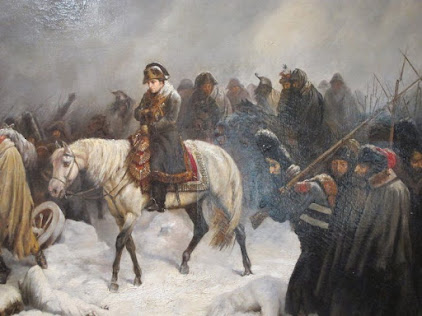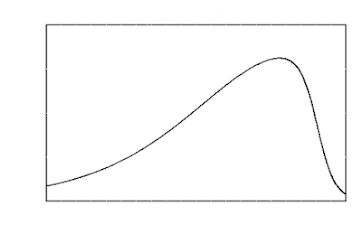The "Zombie Fungus" Cordyceps kills an ant after having taken control of its neural system. Could something like that happen in human societies? That is, is it possible to destroy a country by taking control of its leader? This idea has obvious implications for the current war in Ukraine.
We all know that history never exactly repeats itself, but it rhymes. One of these rhymes has to do with leaders who do enormous damage to the countries they lead. Let me show you a few examples from the past two centuries or so, then we'll discuss the implications for the current situation.
1. 1859 - Louis Napoleon and the Italian Campaign. In 1852, Louis Napoleon (1808-1873) became the new French emperor. His first major military campaign was the Crimean war: it was a victory, but also a major blunder. France had no reason to help Britain to put down the Russians, but that was the practical result of the war. In 1859, Louis Napoleon made a much worse mistake by joining Piedmont in a war against Austria. The campaign was successful but costly, and it led to the creation of a new state, Italy, that would forever block the French attempts to expand in the Mediterranean Sea, along the African coast. In addition, in 1870, Italy made an about-face and joined Prussia in a war against France. The French were badly defeated, and France ceased forever to be a major world power. Louis Napoleon ended his life in exile in England.
2. 1935 - Benito Mussolini and the Italian Empire. In the 1930s, Italy was a growing regional power with good chances of becoming a major player in the Mediterranean Region, possibly even replacing the dominance of the British Empire. However, in 1935, the Mussolini government made an incredible strategic mistake by engaging the country in a major campaign in East Africa to conquer Ethiopia. The campaign was successful, but Italy had made a big favor to Britain by having to keep a consistent fraction of its military forces in a region where they could not be resupplied from the mother country. Then, it gave the British an excuse to wreck the Italian economy by imposing sanctions and a ban on coal exports to Italy. The final result was that Italy arrived at the start of WWII weak and unprepared. The British easily destroyed the Italian contingent in Ethiopia and, from then on, Mussolini couldn't have done better if his purpose was to lead Italy to a humiliating defeat, for instance attacking Greece in 1940 without sufficient forces. Italy was defeated, and Mussolini ended his career hanged upside-down in 1945.
3. 1941, Adolf Hitler and Operation Barbarossa. In 1940, Germany was at the top of its military power. Only Britain had successfully resisted the German attacks, but it was evident that if Germany were to direct the whole industrial and military might of Europe against the British, only a miracle could have saved Britain from being invaded and defeated. Astonishingly, such a miracle occurred in 1941. The Germans nearly completely abandoned their aerial campaign against Britain and attacked the Soviet Union instead, leaving Britain able to recover and regroup. The German decision truly made no sense if we consider that the Germans were risking everything to obtain something they already had: the oil and food resources of the Soviet Union that were abundantly supplied under the terms of the Molotov-Ribbentrop pact of 1939. The result of the campaign was the defeat and the eventual destruction of Germany, while Hitler committed suicide in 1945.
4. 1978 -- Leonid Brezhnev and the Afghan campaign. In the 1970s, the Soviet Union was still a major power in Eurasia, although its growth had been slowing down. Leonid Brezhnev (1906 – 1982) became secretary of the Communist party in 1964 and, in 1978, he ordered a military intervention in Afghanistan to keep the country within the Soviet sphere of influence. The war dragged on for 10 years and it was one of the factors (although not the only one) that led to the collapse and the dissolution of the Soviet Union.
5. 1990 - Saddam Hussein and the invasion of Kuwait. In 1990, Iraq was a growing power in the Middle East region, owing to its abundant oil production. In 1980, the president of Iraq, Saddam Hussein, engaged in a dangerous gamble by attacking Iran. After 8 years of harsh conflict, the war ended basically in a draw, although the Iraqi claimed victory. In the late 1980s, Iraq entered a dispute in which it accused Kuwait of using horizontal drilling technologies to steal oil from Iraq's fields. The dispute escalated until, in 1990, Iraq invaded Kuwait, conquering it completely in a few days. The reaction of the Western Powers was "Operation Desert Storm." In 1991 the retreating Iraqi forces were incinerated by a bombing campaign while the US continued bombing Iraq up to 2003, when the whole country was invaded. Saddam Hussein was then hanged by the Iraqi themselves.
So, let's summarize. We have five cases where we see this sequence of events (there are more examples, but not so evident (*)):
- A regional power, led by a strong leader, starts showing ambitions of becoming an important player in the global domination game.
- The leader engages the country in an attack on a neighboring country, smaller and less powerful.
- The attack looked like a cakewalk, but it turns into a quagmire. It may be successful or not, but it considerably weakens the attacker.
- The Great Powers intervene. The regional power is defeated and destroyed, and its disgraced leader is executed or removed in other ways.
It is impressive how, in this pattern, history doesn't just rhyme. It truly repeats itself, as if the leaders involved were actors following a script. How can that be? I can offer you two explanations
1 -- The pattern is the unavoidable result of the personality of strong leaders. They are, typically, criminal psychopaths with no moral restraints who tend to be reckless in whatever they do. In addition, they tend to be surrounded by sycophants and adulators. At this point, their brain loses contact with reality, and, eventually, they will make a major mistake that leads them to their doom (and, with them, large numbers of innocent people).
2-- There exists a standard procedure that can be used to take control of leaders' minds. Considering how standard propaganda can take control of ordinary people's minds, it shouldn't be surprising that the same trick can be played with leaders. Actually, leaders' minds could be much easier to sway and influence, since leaders tend to live in isolated bubbles where the information they receive is carefully filtered by their staff. Take control of some influential members of the leader's staff (e.g. by corrupting them) and the job is done. We call this method "psychological operation" or "psyop"
Personally, I tend to favor the first hypothesis. When a single leader dominates a group, internal dynamic factors tend to appear, leading the members of the group to try to gain the attention of the boss by proposing over-optimistic plans. Those who recommend caution risk being silenced or ignored and, in any case, the optimists risk much less than the boss himself.
We see this groupthink mechanism very well in the minutes of the reunions of the Italian high command when the attack on Greece was decided, in 1941. At that time, Mussolini was already gone on the other side of criticism and was no more in contact with the real world. So, he was easily influenced by his military staff. One of the most vocal proponents of the attack was general Sebastiano Visconti Prasca (1883 -1961), who repeatedly played down the military risks of the attack and managed to be named commander-in-chief of the operation. The only penalty he suffered was to be relieved of his command after the first attacks failed, then he lived to tell the story and died in his bed.
Another similar case was that of Leonid Brezhnev's decision to invade Afghanistan. It is said that Brezhnev's health had been deteriorating and that, although not very old (he was 70 in 1976) he was not able anymore to take rational decisions. That may have generated a case of groupthink, where the decision may have been the result of the action of a member of the Politburo, the hardline Defense Minister Dmitry Ustinov.
But there are cases in which we have evidence of the active intervention of a foreign power to influence a country leader. The classic case is that of Louis Napoleon in France: the first documented case of such an intervention. The Piedmontese Government had sent to France the Countess of Castiglione, Virginia Oldoini, with the specific task of seducing Louis Napoleon and convincing him to help Piedmont to fight Austria. We cannot say how important was the action of the Countess, but we can't rule out that she changed the course of history. It would not be the first time: the "honey trap" strategy is very old. Do you remember the Biblical story of Judith and Holophernes? It is that old.
Perhaps the most fascinating case of influencing a foreign leader's mind using the honey trap is that of Adolf Hitler, who threw away a nearly certain victory for an uncertain gamble. It may be related to the story of Unity Mitford (1914-1948), a British woman who traveled to Germany in 1934 with the objective of seducing Hitler. She was, most likely, a British agent, but she was successful, probably the only non-German person who became Hitler's intimate friend. She may have influenced Hitler with the concept that the Britons were, after all, "Aryans," just like the Germans. So, the Führer may have been unsure about the idea of unleashing the full German military might on them, preferring instead to turn Germany on those people he considered an inferior race: the Slavic Untermenschen. Mitford is reported to have shot herself in the head in 1939. She survived, but she was crippled and had to leave Germany, never to return. That was two years before Hitler's fatal decision, but her influence on him may have persisted up to that time.
Finally, in the case of Saddam Hussein, we have no evidence of a honey trap being used, but it may well be that he was the objective of another one-man psyop. The US had helped Iraq in the war against Iran, and Hussein saw himself as an ally of the United States. So, he may have been led to believe that the US would continue to support him against Kuwait. He may have been deliberately misled by the US ambassador in Iraq, April Glaspie.
It may well be that both explanations are valid in various degrees in different cases. Some forms of psychological pressure, psyops, work so well because great leaders are especially sensitive to simple human emotions, including stroking their overinflated ego or showing off their manhood. In any case, one thing is certain: Giving all the power to a single man is the greatest mistake a country can make.
Of course, these considerations tell us a lot about the current world situation. There are two cases in progress that seem to be rhyming a lot with those discussed so far: Taiwan and Ukraine. About Taiwan, the recent visit to the island by the speaker of the House of Representatives, Nancy Pelosi, may have been a not-so-subtle ruse to push the Chinese to attack. But the Chinese didn't take the bait, at least so far.
About Ukraine, we have all the elements of the classic pattern of a strong leader who engages a regional power in the invasion of a neighboring country. Initially, it looked like a cakewalk, but it turned out to be a quagmire. The war in Ukraine is still ongoing, and we cannot know if it was the result of a miscalculation generated by groupthink in the Russian government, or if it originates from a one-man psyop directed at the Russian leader, Vladimir Putin. Or maybe both factors, or perhaps something else. It will take time before we'll be able to evaluate this burst of madness, but history is never in a hurry. In any case, the damage done is already enormous, and we can only hope that history will not rhyme in the same way as it did in previous cases. Otherwise, we face a terribly dark future.
(*) Other cases. There are several cases of leaders behaving recklessly or stupidly, although following somewhat different patterns. One is that of the influence of the Crown Princess of Norway, Marta, on President Roosevelt during WWII which may have influenced the US policy (h/t Ollie Hollertz). Then, the Japanese attack on Pearl Harbor in 1941 was surely reckless, but it is also true that it made some sense in strategic terms since it allowed the Japanese navy to move freely in South-Eastern Asia for a while. The USA, in turn, may have fallen in traps with Vietnam and Afghanistan, but in neither case, the resulting quagmire caused the collapse of the attackers. Then, Mikhail Gorbachev, the Soviet leader, handled the Soviet Union to the Western Powers in 1991 in exchange for empty promises. Consider the case of Slobodan Milosevich, the president of Serbia, who, in 1998, was dumb enough to think that Serbia could stand alone against the combined forces of the Western Powers. It couldn't.
Note added after publication. One day after I published this post, the Business Insider came out with an article proposing a thesis very similar to mine. https://www.businessinsider.com/putin-making-strategic-errors-because-no-one-challenges-gchq-2022-10 -- maybe at the UK secret services, they read my blog!







